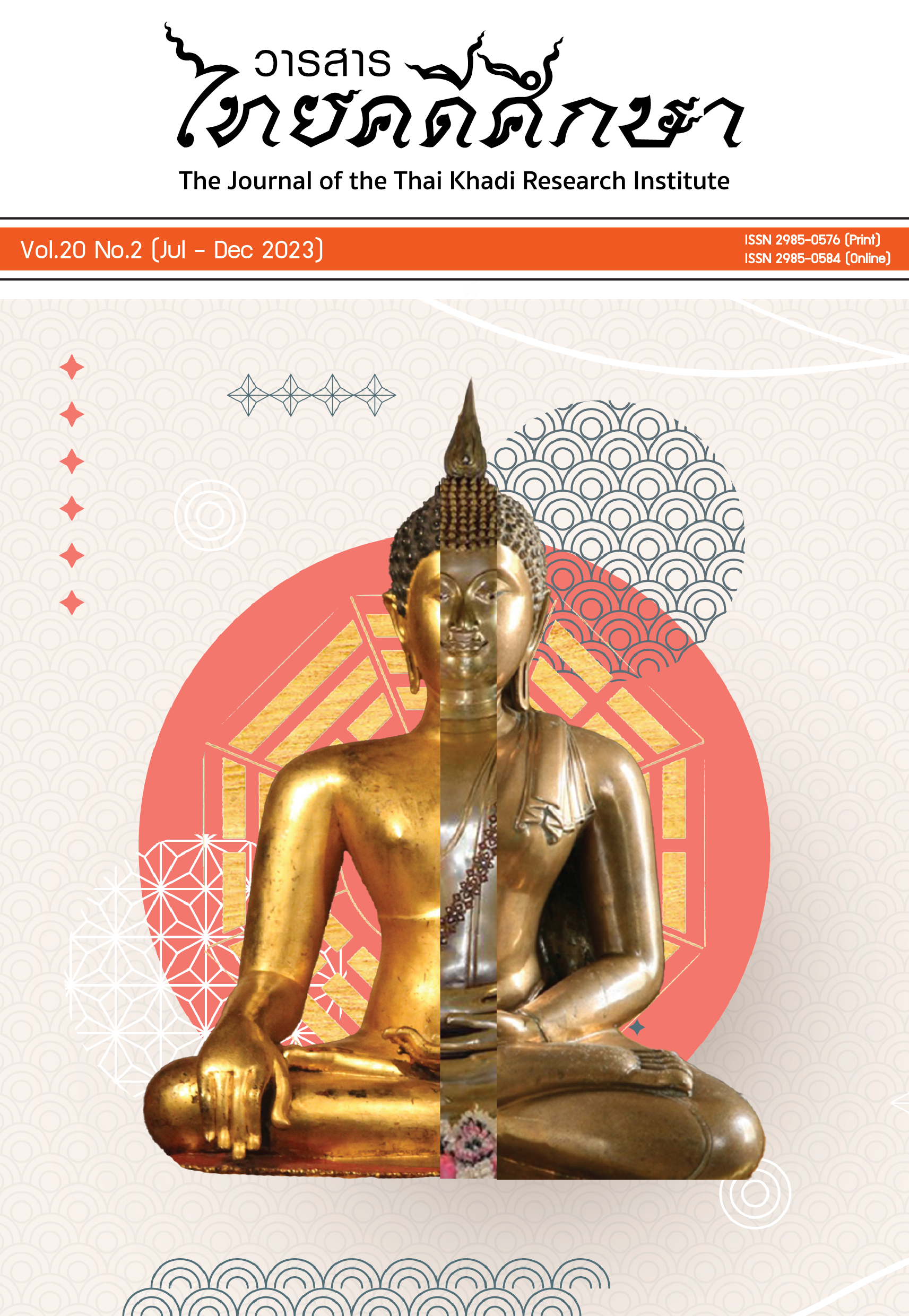ถอดความหมายและบทเรียนจากเรื่องราวการได้เป็นพระอรหันต์ของพระองคุลิมาล
Main Article Content
บทคัดย่อ
บทความเรื่อง “ถอดความหมายและบทเรียนจากเรื่องราวการได้เป็นพระอรหันต์ของพระองคุลิมาล” มีวัตถุประสงค์ เพื่อศึกษาความหมายและบทเรียนจากเรื่องราวการได้เป็นพระอรหันต์ของพระองคุลิมาล โดยมุ่งเน้นการสืบค้นจากพระไตรปิฎกและอรรถกถา พบว่า เป็นประวัติชีวิตของพระอรหันตสาวกที่ชื่อองคุลิมาล ที่ดำเนินไปด้วยกรรมและผลของกรรมมาหลายภพหลายชาติ จนได้เป็นพระอรหันต์ด้วยการหลีกออกไปปฏิบัติสมณธรรมแต่เพียงลำพัง ด้วยความตั้งใจอุทิศทั้งกายและใจ ตั้งอยู่ในความไม่ประมาทจนได้ปัญญาอันยิ่ง ส่วนที่เป็นความหมายแฝงนั้นเป็นความหมายในทางธรรม พบว่า เป็นเรื่องของหลักธรรมทางพระพุทธศาสนา ประกอบด้วยหลักกรรมที่มีสาเหตุเกิดจากอกุศลมูล (โลภ โกรธ หลง) สามารถหลุดพ้นจากบ่วงกรรมนี้ได้ด้วยหลักธรรมที่ชื่อว่า ไตรสิกขา (ศีล สมาธิ ปัญญา) โดยมีกัลยาณมิตรคือพระพุทธเจ้าและคำสั่งสอนของพระพุทธเจ้า คอยประคับประคองให้ความช่วยเหลือ เรียกได้ว่าเป็นสูตรที่เรียงร้อยความหมายของหลักธรรมสำคัญในพระพุทธศาสนาไว้อย่างแยบคายภายใต้ประวัติชีวิตของบุคคลที่ได้เป็นพระอรหันต์ สามารถถอดเป็นบทเรียนได้หลายประการ ได้แก่ ความสำคัญของการเปลี่ยนทิฏฐิจากมิจฉาทิฏฐิเป็นสัมมาทิฏฐิ การมีไตรสิกขา ความสำคัญของกัลยาณมิตร ความเสียหายที่เกิดจากการมีปาปมิตร ข้อคิดควรระวังในการให้โอกาสต่อผู้กระทำความผิดที่ควรอยู่ในกฎระเบียบและความเหมาะสม เพื่อป้องกันการเกิดความอยุติธรรมในสังคม และเป็นเรื่องราวที่เป็นตัวอย่างของชาติในขณะจิตที่เป็นประโยชน์ต่อการบรรลุธรรม และแนวคิดเรื่องกรรมที่ส่งผลอย่างมีความคงตัวสูง จึงควรสำรวมระวังกาย วาจา ใจในการกระทำกรรมไว้เป็นอย่างยิ่ง
Downloads
Article Details

อนุญาตภายใต้เงื่อนไข Creative Commons Attribution-NonCommercial-NoDerivatives 4.0 International License.
ผู้เขียนจะต้องลงนามในแบบฟอร์มรับรองบทความ เพื่อให้คำยืนยันความรับผิดชอบว่า บทความของผู้เขียนนั้นไม่เคยตีพิมพ์ที่ใดมาก่อน พร้อมรับทราบว่า กระบวนการส่งบทความเข้าพิจารณาและตีพิมพ์ในวารสารไทยคดีศึกษานั้น จะไม่มีการเรียกเก็บค่าใช้จ่ายในการดำเนินการ ยกเว้น ในกรณีที่ผู้เขียนขอยกเลิกการตีพิมพ์บทความในวารสารไทยคดีศึกษาไม่ว่าด้วยสาเหตุใด และหลังจากบทความนั้นเข้าสู่กระบวนการพิจารณาของผู้ทรงคุณวุฒิไปแล้ว ผู้เขียนจะต้องรับผิดชอบต่อค่าใช้จ่ายที่เกิดขึ้นในกระบวนการประเมินเป็นจำนวนเงิน 3,000 บาท (สามพันบาทถ้วน)
เอกสารอ้างอิง
Chaibangyang, P. (2013). 80 พระอรหันต์ ฉบับสมบูรณ์ เพื่อการศึกษา ค้นคว้า และอ้างอิงในพระไตรปิฎก: อดีตชาติของพระอสีติมหาสาวก การวนเวียน ไปตามภพภูมิต่าง ๆ ด้วยอำนาจกรรมและความพิเศษแห่งบารมี [The complete edition of 80 Arahants for study, research and reference in the Tripitaka: The Past Lives of Asiti the Great. Roaming around different worlds with power, karma and the specialness of prestige]. Bangkok: Dharma Council.
Jansawang, K. & Prombutara, S. (2019). ทุนมนุษย์กับการเปลี่ยนแปลง: กระบวนทัศน์ใหม่ของการบริหารทรัพยากรมนุษย์ [Human Capital with Change: A Paradigm Shift of Human Resource Management]. Journal of Management Sciences, 6(2), 219 - 222.
Kaew, S. (1978). ลัทธินอกพระพุทธศาสนาเปรียบเทียบกับพระพุทธศาสนา. [Non - Buddhism compared to Buddhism]. Bangkok: Suphot Karn Pim.
Longsombun, P. (n.d.). พจนานุกรม มคธ - ไทย [Bihar - Thai Dictionary]. Bangkok: Ruang Panya Shop.
Mahachulalongkornrajavidyalaya. (1996). พระไตรปิฎกภาษาไทย ฉบับมหาจุฬาลงกรณราชวิทยาลัย [Tripitaka in Thai of Mahachulalongkornra javidyalaya edition]. Bangkok: Mahachulalongkornrajavidyalaya printing house.
Mahamakutrajavidyalaya. (1994). พระไตรปิฎกและอรรถกถาแปล ฉบับมหา มกุฏราชวิทยาลัย [Tripitaka and translation commentary in Thai of Mahamakutrajavidyalaya edition]. Bangkok: Mahamakutrajavidya laya printing house.
Meeting of the Royal Ordinance Region 3, the Royal Ordinance in the reign of King Rama I (Part 2). (1921). Phra Nakhorn: Sophonphiphanthanakon printing house.
Phra Brahmakunaphorn (P.A. Payutto). (2015a). พจนานุกรมพุทธศาสน์ ฉบับประมวลธรรม (พิมพ์ครั้งที่ 23) [Buddhist Dictionary Dharma Book] (23th ed.). Bangkok: Pallitham Publishing, a subsidiary of Pet and Home Publishing Company Limited.
Phra Brahmakunaphorn (P.A. Payutto). (2015b). พุทธธรรม ฉบับปรับขยาย (พิมพ์ครั้งที่ 43) [The Buddhadhamma extended edition] (43th ed.). Bangkok: Pallitham Publishing, a subsidiary of Pet and Home Publishing Company Limited.
Phra Buddha Gosa Thera (Wrote). (2013). คัมภีร์วิสุทธิมรรค (พิมพ์ครั้งที่ 11) [The Visuddhimagga Scripture] (11th ed.). Bangkok: Thanapress Company Limited.
Phra Dhammakosajarn (Nguem Indhapanyo). (2015). ธรรมะ 9 ตา (พิมพ์ครั้งที่ 5) [Dharma 9 Eyes] (5th ed.). Bangkok: Amarin Dharma, Amarin Printing and Publishing.
Phra Phutthaworayan (Mongkol Wirotchano). (2005). เก็บเล็กผสมน้อย ฉบับสมบูรณ์ [A complete collection of little mixes]. Bangkok: N.P.
Phra Thepkitti Panyakun (Kittiwutho Bhikkhu). (2004). กรรม - การให้ผล [Karma - giving results]. Bangkok: Sahathhamik Printing Co., Ltd.
Phra Thepmuni (Wilas Yanawaro). (1984). กรรมทีปนี [Karma Dipanee]. Bangkok: Roong Ruangtham Printing House.
Pokaeo, S. (2010). จากจิตวิทยาสู่พุทธธรรม [From Psychology to Buddha dhamma]. Nakorn Pathom: Contemplative Education Center, Mahidol University.
Pornchokchai, Sophon. (2021). ชูพระไตรปิฎกวิพากษ์พระมหาวุฒิชัยที่อ้างองคุลิมาลมาบวช น็อต [Raises the Tripitaka for the criticizing of Phra Maha Wuttichai, who claimed Angulimala’s story for ordination for Not]. Retrieved August 6, 2021.
https://www.area.co.th/thai/area_announce/area_press.php?strquey=press_announcement17 18.htm.
Puangsomjit, T. (2021). อภิปรายความการเป็นพระอรหันต์ของพระองคุลิมาล ว่าด้วยพุทธธรรมและทุนมนุษย์ [Discussion on the Being an Arahanta of Phra Ongkhulimal Concerning Buddhist Dhamma and Human Capital]. Bangkok: Thai Khadi Research Institute, Thammasat University.
Rattanasuwan, P. (1995). พระราชปุจฉาเรื่องเหตุใดผู้ร้ายฆ่าคนตายจึงเป็นพระอรหันต์ได้ [The Royal Question for why that the Murderer be becoming an Arahant]. Bangkok: Rongphim Winyan.
Supasorn, P. (2011). กรรม การเกิดใหม่ และอนัตตา [Karma, Rebirth and Anatta]. Bangkok: J Print Printing.
Wat Thai Chetawan Maha Viharn. (2021). มหาโจรกลับใจ [Repentant Thief]. Retrieved February 1, 2021, from http://www.watthaichetavan. org/index.php?lay=show&ac=article&Id=538706834&Ntype=1.
Wedchayanon, N. (2008). มิติใหม่ในการบริหารทุนมนุษย์ [A new dimension in human capital management]. Bangkok: Graphico Systems.


